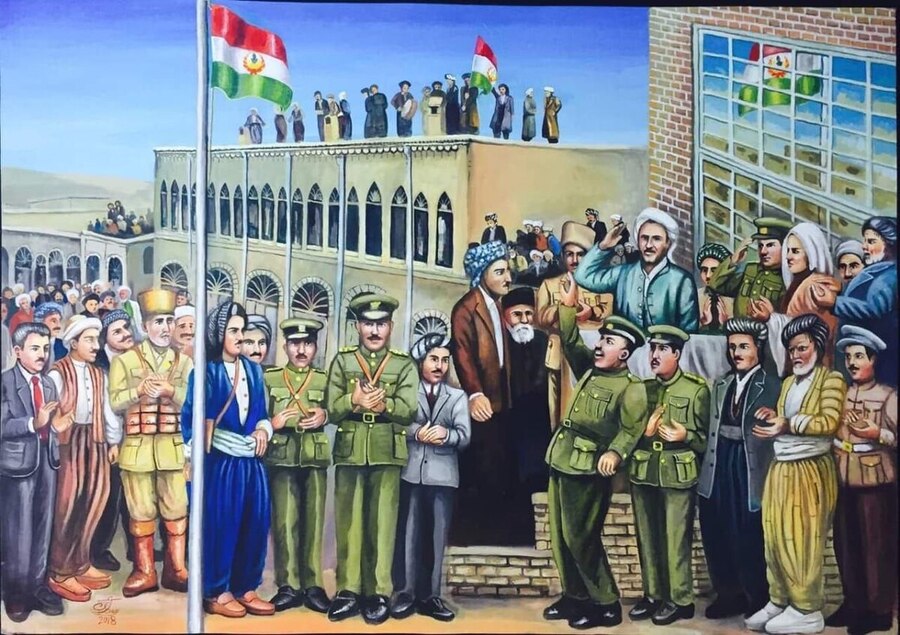Kurdshop - Mother Land play was one of the most important plays in 1946 that was performed at the time of the Kurdistan Republic. Several significant steps were taken to enhance the Kurdish people's awareness. One of those important works was the "Mother Land" play performance.
Mother Land play is considered to be the first play in the Kurdish language in the East part of Kurdistan.
Qazi Mohammad talked about this play as follows: "This is a message to the Kurds; it is as if I have stepped on the stage and talked to people. However, a play can have a much deeper influence on people than my speeches. Thus, it is important to know this play by heart and practice it."
"Chris Kochera" in his book called "The Kurdish National Movement," wrote: "Qazi Mohammad wrote several play scripts about historical and national subjects, especially Salahaddin play that talks about the Kurds' revolution against the Christians or the Mother Land play that talks about Kurds' fate after "Saydabad" treaty was signed between Iran, Iraq, Turkey, and Afghanistan in 1937. These two plays were performed in Mahabad."
It is said that the play was performed in 1946 at the time of the Kurdistan Republic. This play was performed in five acts including: "Angle Act, Saydabad Treaty, Mother Land, redeeming Mother Land, and the act of establishing the Kurdistan Republic".
The story of this play: an angle talks about human beings and their countries and nations; Mother Land is tied up with a chain and asks for her freedom; the Land's children rush to Mother Land's aid; the enemies design plots; the Peshmerga and the redeeming forces are freeing Mother Land. The Kurds made their hopes come true and they established the Kurdistan Republic.

The play's time span
According to the "Mother Land Play and Castle of Hope" book, this play was performed for 2:30 to 3 hours. However, a music group performed musical pieces for 15 minutes between the two acts and another group performed anthems, so about 40 minutes to 60 minutes was dedicated to music. Thus, the play was performed in 90 minutes.
During the play was performed several anthems such as "God please free the land", "Hey Kurdistan", "Beautiful Kurdistan", and "Our religion, our land" were performed.
The actors were: angles, Mother Land, Iran, Iraq, Turkey, and Afghanistan representatives, the President, 7 to 8 Peshmergas, and some Cabinet members.
The play was performed in Mahabad, Naghada, and Shino (Oshnaviyeh). The performance took about 40 days to 2 months. A lot of people were invited to watch Mother Land play among whom were several Russian Officers and "Ceiferof". "Sirus Habibi" played the role of the angel. He would come into the scene with a long white gown and two large wings. He would recite a poem by "Haji Qader Koyi" praising God commencing with this verse:
Thou who is unique and distinct and will stay forever
Thou who have no lands or homes, always awake and always revive

The second act of the play was about the "Saydabad" Treaty. Music and songs would play amidst this act. In the third act, Mother Land's hands and legs were tied in chains while she had a black gown and Haji Qader Koyi's poem would be recited.
Songs and music were performed continually. In the fourth act, Kurdish Peshmerga and Russian soldiers would free Mother Land. The fifth act was establishing the Kurdistan Republic and the Ministers Council, the Kurdistan flag was waving and the President was elected.
In this act, the President would give a speech and he talked about the freedom of Kurdistan and Kurds' situation under the dominance of Turks, Persians, and Arabs. He talked about the Great Kurdistan and Sheikh Abdulqader, Sheikh Saeed, and Sheikh Mahmoud's goals.
In the end, all the actors would come on the stage and they would sing the "Colorful Land" anthem.
After the play was over, "Peshawa Qazi Mohammad" would step on the stage and he would give a speech with tears in his eyes. This was a very emotional moment for all the people. Qazi Mohammad would talk about the history of Kurdish revolutions, colonialism, Kurdistan division, and Kurdistan oppressions by the colonialist governments. He also talked about the Kurdistan uprisings.










